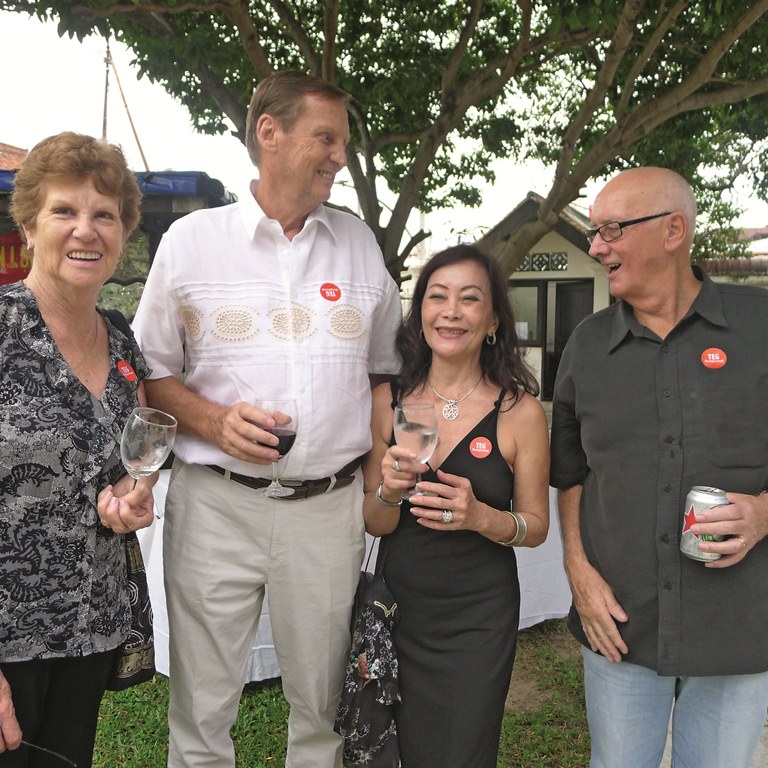The History of the Blue Mansion
The Blue Mansion is one of those Penang houses that can truly be called “iconic” meaning that it’s one of those instantly recognisable George Town buildings that seem to sum up the spirit of the place. Certainly the intense indigo blue that coats the walls has something to do it with and also the fact that it is exquisitely decorated both on the exterior and the interior. The blue itself tells a story – it is a nod to the indigo that the British, who were then in charge of Penang, brought from India, another colonial possession. Many buildings of the period were lime-washed in white to make them cooler. Although white reflects the heat of the sun very effectively, it is not an auspicious colour for the Chinese as it’s used for funerals. So blue was a diplomatic choice that paid respect both to the powers of the time and the cultural traditions of China.
Although the Mansion was built in the 1890s, the architecture is reminiscent of a much earlier Chinese dynasty and the entire building is constructed on feng shui principles. But it’s not just a Chinese house, it also incorporates elements of the West as well. There are Gothic louvred windows, floor tiles from Stoke-on-Trent, art nouveau stained glass, and cast iron work from Glasgow. There is extraordinary attention to detail – even the shutter mechanism of the windows embodies the Taoist concept of yin and yang.
It was the home of a very exceptional immigrant – Cheong Fatt Tze. Of Hakka ancestry, he was born in Guangdong province in 1840. At the age of 16, he migrated to Indonesia where he worked as a water-carrier and a shopkeeper in Jakarta. With the help of his father-in-law, he started a company trading in coffee, tea, and rubber which expanded to Medan. He even bought a bank. Through hard work and perseverance he made an immense fortune that won him the unoffi cial title of “The Rockefeller of the East”. He had plenty of imperial Chinese titles as well by the time he arrived in Penang in the 1880s and built the Blue Mansion. Like many successful businessmen however, he was able to play both sides in a conflict. Despite being decorated by the Manchu imperial palace, he also secretly supported the work of Dr Sun Yat-sen, the Father of Modern China, who lived in Penang in 1911. Cheong Fatt Tze’s personal life was no less colourful. By the time he came to the Blue Mansion, he had acquired no less than seven wives.
Over the years following his death the Mansion fell into disrepair and was said even to be a haunted house. Fortunately a group of Penangites were determined to rescue the building and return it to its former glory and it is now one of George Town’s finest boutique hotels.
The Expat Penang Mingle
The birds were still twittering as the sun went down and the guests drifted in. Rather bravely given the uncertainties of the weather at the moment, we held the event outside in the elegant garden of the mansion. There was a back-up plan to move the event into the reception area, a noble room in itself, should rain pour down. Thankfully it wasn’t needed so we could chat and mingle in nature. Many members of the IWA attended as well as many people who have only newly arrived in Penang.
The Mansion provided some delicious and refined finger food including: Egg tofu with Marmite eggplant and chicken floss, Smoked Duck with mango salad, Wasabi Prawn, and Honey Chicken. There was even Asian spiced jellyfish, though one participant remarked that it wasn’t quite the season for jellyfish!
Dr Louis Leh, a skin doctor who has an aesthetic practice in Penang, provided the door prize – a generous voucher. He specialises in minimally invasive work, stressing that we look better as we age, as long as our faces are brought into harmony.
We would like to thank Marlene Martin and Val Olson for their services on the Welcome Desk.
Join us for our next Penang Mingle. Details here.
Read more:
- The Expat Penang Mingle at Santai Bistro
- The Expat Penang Mingle at Hillside Cafe
- The Expat Penang Mingle at Lok Thye Kee
Source: The Expat magazine October 2015
"ExpatGo welcomes and encourages comments, input, and divergent opinions. However, we kindly request that you use suitable language in your comments, and refrain from any sort of personal attack, hate speech, or disparaging rhetoric. Comments not in line with this are subject to removal from the site. "





















